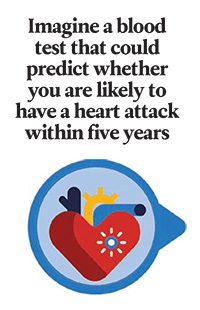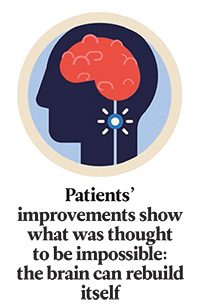Health Breakthroughs for a New Year
From cancer to migraines to arthritis, some exciting advances in early diagnosis and treatments

New Tests Detect Deadly Lung Cancer Early
Early diagnosis is one of the best ways to beat cancer and there is good news on this front. Two new tests for lung cancer can detect this killer in time for treatment to be effective, thus giving patients a better chance for a cure.
In the first test, developed by Vadim Backman, professor of Biomedical Engineering at Northwestern University, Illinois USA, cell samples taken from inside an individual’s cheek are viewed through a specialized microscope. The microscope detects particular cellular changes, indicating whether lung cancer may be developing.
The second is a simple breath test! Exhaled breath contains thousands of volatile organic compounds (VOCs) that vary in composition and pattern. A subset of four VOCs have been discovered in the exhaled breath of lung cancer patients.
Cambridge, England-based Owlstone Medical developed a microchip sensor technology to measure VOCs in exhaled breath. This type of technology already exists. Co-founder and president of Owlstone Medical, Billy Boyle, says their smaller and less expensive device may become an in-office tool for doctors.
“We hope that breath analysis will allow us to diagnose patients with primary or recurrent lung cancer long before they suffer from symptoms, when we have more options for treating them, giving them the best chance for cure,” says cardiothoracic surgeon, Erin M. Schumer, MD, MPH, whose research on this technique was published in early 2016 in The Annals of Thoracic Surgery.
Smell Test Could Detect Prostate Cancer
A “smell” test promises to be an immediate and accurate diagnostic tool for prostate cancer. This may save thousands of lives and save thousands of men from having to undergo invasive investigations. The test is now in advanced clinical trials and is expected to be available to in late 2017.
Dr. Raj Persad, Consultant Urologist at Southmead Hospital, England, said: “If this test succeeds a full medical trial it will revolutionize diagnostics.
“Even with detailed biopsies there is a risk we may fail to detect prostate cancer in some cases.”
More than 1.1 million cases of prostate cancer were recorded globally in 2012, according to the World Cancer Research Fund International.

What’s Your Heart Attack Risk?
Imagine the day when a blood test could predict whether you are likely to have a heart attack within five years, thus allowing you and your medical practitioner to do everything possible to prevent such an event.
Well, another simple blood test, developed by researchers at the National Heart and Lung Institute, Imperial College London, promises to do just that.
If clinical trials are successful, instead of using age, sex, cholesterol and blood pressure levels and medical history to evaluate your risk of heart problems, the new test looks at protective antibodies that already exist in your system. These immune-system-produced antibodies, called IgG, seem to shield the body from a heart attack, even when cholesterol and blood pressure are high.
In the trial, those with the highest number of IgGs had a 58 percent lower risk of developing coronary heart disease or having heart attack. These individuals also had a 38 per cent lower chance of suffering a stroke during the five-year trial period.
Treatment Breakthrough for Breast Cancer
“Astonishing!” and “Ground breaking!” and “Game-changing potential!” is how breast cancer experts are describing the results from a recent trial.
Researchers from Cancer Research UK gave women with aggressive breast cancer a combination of two cancer-treating drugs: Herceptin (trastuzumab) and Tyverb (lapatinib). After 11 days of treatment with the drug combo, 17% of women saw their tumors shrink drastically. Even more impressive: Tumors completely disappeared in another 11% of women given both drugs.
In the trial, the researchers had been looking to see how the combined drug treatment affected tumors between diagnosis and surgery; the “unexpected” results were “dramatic”. Both drugs are current breast cancer treatments, so the combination therapy could be prescribed very soon—excellent news for some breast cancer patients.
Non-Invasive help for the partially blind
Until now, vision loss due to glaucoma or optic nerve damage has generally been considered irreversible. But a German clinical trial results published in June 2016 has demonstrated significant vision improvement in partially blind patients after 10 days of noninvasive, transorbital alternating current stimulation (ACS): This is when alternating currents of electricity are applied to the area of the brain that processes vision.
“ACS treatment is a safe and effective means to partially restore vision after optic nerve damage,” commented lead investigator Bernhard A. Sabel, PhD, of Otto-von-Guericke University of Magdeburg, Germany.
And more good news for those with low vision: A specialized miniature camera mounted onto their
eyeglasses, dramatically improves their ability to read.
The device recognizes text and reads it to the user who uses an earpiece, according to researchers with UC Davis Health System, California. The device can also be programmed to recognize faces and money and grocery items.
Blood Tests Accurately Detect Alzheimer’s
Like cancer, early diagnosis of Alzheimer’s disease can be of tremendous benefit to the patient. Two blood tests—developed separately and an ocean apart—can detect with an extremely high degree of accuracy if a person with mild cognitive impairment (MCI) is in the early stages of Alzheimer’s, or another cause of dementia.
Researchers at Rowan University in New Jersey, USA and at the Universities of Ruhr Bochum and Gottingen, Germany, both developed blood tests. More than 47 million people worldwide have dementia, and for the majority of them, their dementia is caused by Alzheimer’s.
This is a big advance as it offers many potential benefits for Alzheimer patients. It could allow specialists to slow the progression of the disease through lifestyle adjustments, medication and planned medical care. The German test has completed clinical trial, and further studies are now needed.
Stunning Recoveries Long After a Stroke
A 71-year-old wheelchair-bound stroke victim is walking again.
Scientists at California’s Stanford University School of Medicine have reported that seven of 18 stroke patients who agreed to undergo a trial therapy injecting stem cells into the damaged parts of their brains, have showed “stunning” results.
Gary Steinberg, the study’s lead author and chair of neurosurgery at Stanford, said in an interview that while he is cautious about “overselling” the results of such a small study, his team has been “stunned” that seven of the 18 patients experienced significant improvement in their abilities following treatment.
“Their recovery was not just a minimal recovery like someone who couldn’t move a thumb now being able to wiggle it. It was much more meaningful,” said Steinberg, who personally performed most of the surgeries.
Incredibly, the therapy worked for patients whose strokes had occurred between six months and three years previously. The new therapy essentially turns the adult brain back to an infant brain so that it can rebuilditself—something that was not thought possible until now.

The scientists believe the therapy could also work for traumatic brain injury and neurodegenerative conditions such as Alzheimer’s disease, Parkinson’s and Lou Gehrig’s Disease.
Nicholas Boulis, a neurosurgeon and researcher at Emory University, Georgia, USA, said, “There is certainly reason to be enthusiastic based on the magnitude of responses from these patients.”
Vaccine Coming To Fight Against Hospital Germs
Today we worry that we may get sicker when we’re in hospital than we were when admitted—and it’s no joke. Germs continue to flourish in hospitals, and C-difficile is one of the most prevalent and dangerous, especially for the elderly. But a vaccine may soon be available.
Scientists from the Max Planck Institute of Colloids and Interfaces, in Potsdam and the Freie Universität, Berlin, have developed a substance that elicits an immune response against the gut bacterium, Clostridium difficile.
The potential vaccine primes the immune system to recognize the pathogen itself, and produce antibodies to destroy it. The discovery may pave the way for developing inexpensive and effective vaccines and drugs against C. difficile. Other companies are also working on a vaccine, including Pfizer and Sanofi Pasteur.
Lighting Can Lighten the Pain for Migraine Sufferers
Green light gets the green light for migraine sufferers as researchers at Harvard University have found that low-intensity green light seems to reduce pain.
It’s been known for some time that light can trigger or increase pain for migraine sufferers: White, blue, red and amber light all increase migraine pain. But with the discovery that green reduces the pain, the team hopes that specially developed sunglasses that screen out all lightwaves except green will help.
Says Rami Burstein, PhD and Harvard professor of anethesia, “We were surprised to see that blue light was no more painful than white or amber or red, says Burstein. “They were all painful.”
But even more surprising was the finding that low intensities of green light lowered the volunteers’ suffering.
Electrical Stimulus Reduces Arthritis Pain
Clinical trials delivering electric current to the vagus nerve—which runs from our brain stem to our abdomen – have demonstrated that stimulating the vagus nerve significantly improved pain and swelling in patients with rheumatoid arthritis (RA).
RA is a chronic inflammatory disease that affects approximately three million people across continental
Europe. The findings were announced in July 2016 by Dutch and American researchers.
“These results support our ongoing development of bioelectronic medicines designed to improve the lives of people suffering from chronic inflammatory diseases and give healthcare providers new and potentially safer treatment alternatives at a much lower total cost for the healthcare system,” says Anthony Arnold, Chief Executive Officer of SetPoint Medical While focused on rheumatoid arthritis, the trial’s results may have implications for patients suffering from other inflammatory diseases, including Crohn’s, Parkinson’s, Alzheimer’s and others.



